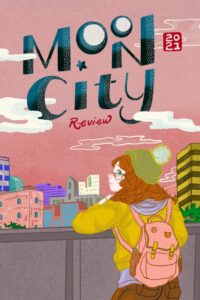
In August of 2021, Moon City Review, a student and faculty run literary magazine, released their annual publication.
Under the direction of Michael Czyzniejewski, associate professor of English, Moon City Review’s staff has been comprised of Missouri State University faculty and students since 2013. As an annual publication they publish writers from all over the world in fiction, poetry, literary nonfiction, translations, and even graphic narrative pieces.
“We spend half the time talking about creative writing and what’s everybody doing and what’s going on in our world. We laugh and joke around. It’s partly like we’re teaching them what publishing is and what publications are and how to get published and what that insight insider view is but it’s also a community,” he explained.
In addition to being editor-in-chief for the literary magazine and managing editor for its press, Czyzniejewski also teaches a course in small press publication. Especially considering how the pandemic has shifted behaviors in the literary and publishing world, the question on everyone’s mind is will this be the end of print books?
This isn’t Czyzniejewski’s first rodeo.
“In 1995 everyone was like, ‘well that’s the end of the book, here’s the internet. No more books.’ Then again, in 2009, when the Nooks and the Kindles came out.” But he brought up an important point of why e-readers have yet to completely enrapture the bibliophile community, the physical book itself. “How do you get that sign? How do you go to an author reading and go, ‘Here, sign my kindle!’ It’s a souvenir.”
But even Czyzniejewski has recognized the benefits of turning to an electronic format, especially in the literary magazine world. Moon City Review has gone through many changes over years. It began as a student-run literary magazine, printing student-made works. In the late 2000s, it became a project that a different English teacher would take on every year. Finally, when Czyzniejewski arrived with a background in editing, he shifted the tone of the publication to focus on becoming an international literary journal. He wanted to build a team made up of students and faculty but wanted to broaden the submissions to the community of international writers. And as a result, the magazine has seen a rise in submissions.
“If we get 3,000 submissions a year and we only print a dozen we have serious conversations. Is this gonna be one of the dozen stories?” —Michael Czyzniejewski
Many of the staff are writers themselves, interested in getting published. By approaching other people’s writing from an editor perspective, they develop their own understanding of how they can grow as writers.
Czyzniejewski and his fiction staff meet on-campus weekly, every Friday at 3:30 p.m. One might think that there would be nothing harder to do than get a group of undergraduates together for an afternoon just before the weekend but something keeps his team coming back every week.
“I work for another literary journal outside of this and I’ve never met most of the staff on that journal even though I’ve worked for them for almost ten years because we live around the world,” said Czyzniejewski.
When the pandemic hit Moon City Review, much like many other literary journals, it had an impact. “People aren’t buying books on Zoom,” explained Czyzniejewski. Their issue release was delayed by five months, they had to adapt to Zoom meetings and promoting events like author readings and discussions via online platforms, and even considered going to an all-online format at one point. Despite the twists and turns the journal has undergone, one thing hasn’t changed, the sense of community.
So, are books going anywhere? It’s hard to say. One thing is certain, books have cultivated a sense of community, be it with readers, writers, or publishers, that’s held the test of time.
On October 14 at 7 p.m. in PSU 400, the English Department will host a reading event featuring Missouri State alumni Kevin Brockmeier.
